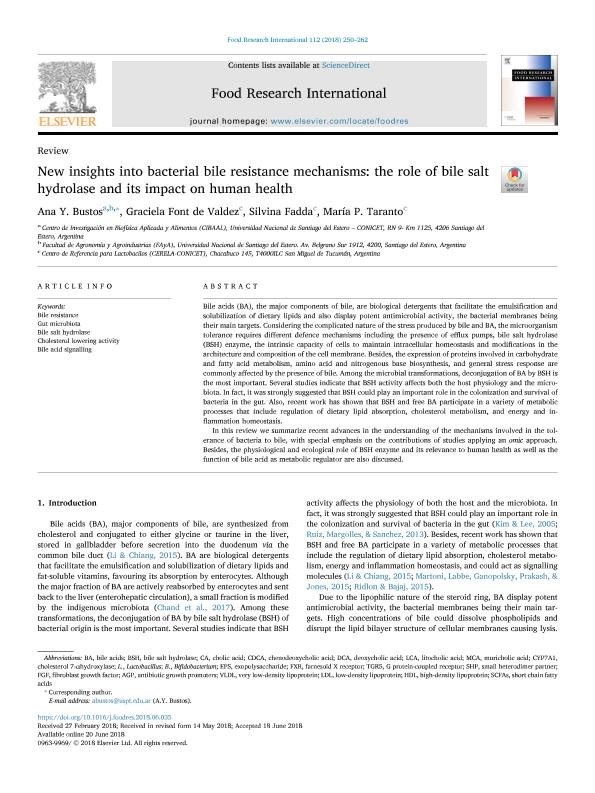Mostrar el registro sencillo del ítem
dc.contributor.author
Bustos, Ana Yanina

dc.contributor.author
Font, Graciela Maria

dc.contributor.author
Fadda, Silvina G.

dc.contributor.author
Taranto, Maria Pia

dc.date.available
2019-08-30T18:40:55Z
dc.date.issued
2018-10
dc.identifier.citation
Bustos, Ana Yanina; Font, Graciela Maria; Fadda, Silvina G.; Taranto, Maria Pia; New insights into bacterial bile resistance mechanisms: the role of bile salt hydrolase and its impact on human health; Elsevier Science; Food Research International; 112; 10-2018; 250-262
dc.identifier.issn
0963-9969
dc.identifier.uri
http://hdl.handle.net/11336/82633
dc.description.abstract
Bile acids (BA), the major components of bile, are biological detergents that facilitate the emulsification and solubilization of dietary lipids and also display potent antimicrobial activity, the bacterial membranes being their main targets. Considering the complicated nature of the stress produced by bile and BA, the microorganism tolerance requires different defence mechanisms including the presence of efflux pumps, bile salt hydrolase (BSH) enzyme, the intrinsic capacity of cells to maintain intracellular homeostasis and modifications in the architecture and composition of the cell membrane. Besides, the expression of proteins involved in carbohydrate and fatty acid metabolism, amino acid and nitrogenous base biosynthesis, and general stress response are commonly affected by the presence of bile. Among the microbial transformations, deconjugation of BA by BSH is the most important. Several studies indicate that BSH activity affects both the host physiology and the microbiota. In fact, it was strongly suggested that BSH could play an important role in the colonization and survival of bacteria in the gut. Also, recent work has shown that BSH and free BA participate in a variety of metabolic processes that include regulation of dietary lipid absorption, cholesterol metabolism, and energy and inflammation homeostasis. In this review we summarize recent advances in the understanding of the mechanisms involved in the tolerance of bacteria to bile, with special emphasis on the contributions of studies applying an omic approach. Besides, the physiological and ecological role of BSH enzyme and its relevance to human health as well as the function of bile acid as metabolic regulator are also discussed.
dc.format
application/pdf
dc.language.iso
eng
dc.publisher
Elsevier Science

dc.rights
info:eu-repo/semantics/openAccess
dc.rights.uri
https://creativecommons.org/licenses/by-nc-sa/2.5/ar/
dc.subject
Bile Acid Signalling
dc.subject
Bile Resistance
dc.subject
Bile Salt Hydrolase
dc.subject
Cholesterol Lowering Activity
dc.subject
Gut Microbiota
dc.subject.classification
Bioquímica y Biología Molecular

dc.subject.classification
Ciencias Biológicas

dc.subject.classification
CIENCIAS NATURALES Y EXACTAS

dc.title
New insights into bacterial bile resistance mechanisms: the role of bile salt hydrolase and its impact on human health
dc.type
info:eu-repo/semantics/article
dc.type
info:ar-repo/semantics/artículo
dc.type
info:eu-repo/semantics/publishedVersion
dc.date.updated
2019-08-20T14:14:23Z
dc.identifier.eissn
1873-7145
dc.journal.volume
112
dc.journal.pagination
250-262
dc.journal.pais
Canadá

dc.journal.ciudad
Ottawa
dc.description.fil
Fil: Bustos, Ana Yanina. Universidad Nacional de Santiago del Estero; Argentina
dc.description.fil
Fil: Font, Graciela Maria. Consejo Nacional de Investigaciones Científicas y Técnicas. Centro Científico Tecnológico Conicet - Tucumán. Centro de Referencia para Lactobacilos; Argentina
dc.description.fil
Fil: Fadda, Silvina G.. Consejo Nacional de Investigaciones Científicas y Técnicas. Centro Científico Tecnológico Conicet - Tucumán. Centro de Referencia para Lactobacilos; Argentina
dc.description.fil
Fil: Taranto, Maria Pia. Consejo Nacional de Investigaciones Científicas y Técnicas. Centro Científico Tecnológico Conicet - Tucumán. Centro de Referencia para Lactobacilos; Argentina
dc.journal.title
Food Research International

dc.relation.alternativeid
info:eu-repo/semantics/altIdentifier/doi/https://doi.org/10.1016/j.foodres.2018.06.035
dc.relation.alternativeid
info:eu-repo/semantics/altIdentifier/url/https://linkinghub.elsevier.com/retrieve/pii/S0963996918304812
Archivos asociados
